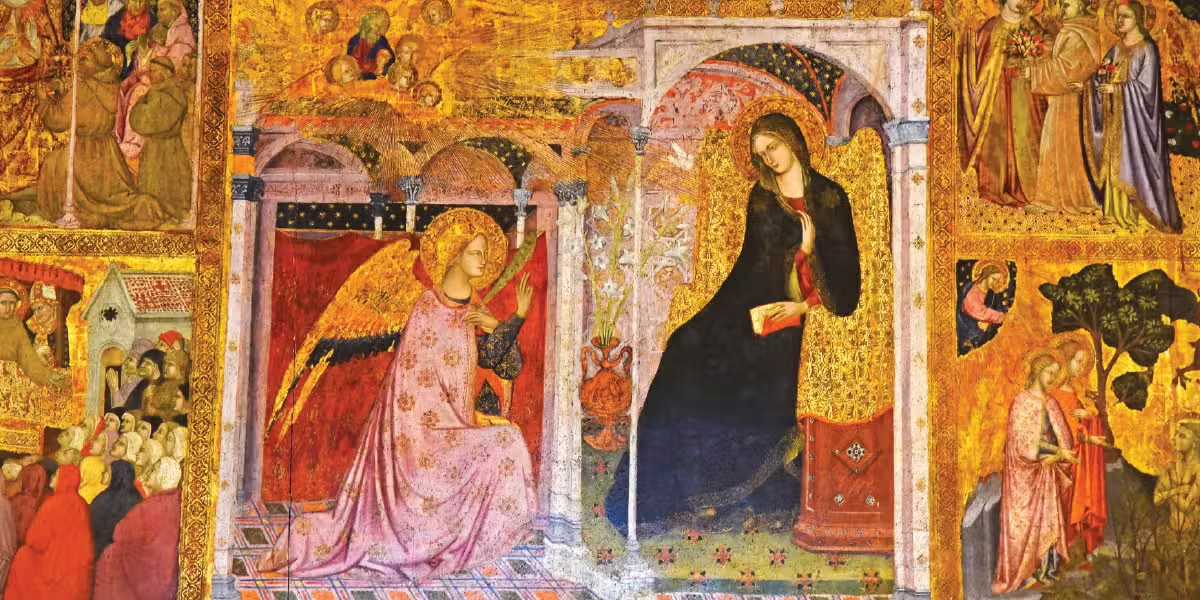I have heard that St. Francis of Assisi was very devoted to Mary, the mother of Jesus. Why? Did Francis write about her?
Yes, Francis was very devoted to her, probably because she offers the clearest evidence of Jesus’ incarnation. Thomas of Celano, Francis’ first biographer, describes Francis’ three main devotions about Jesus as his crib, cross, and presence in the Eucharist.
When Francis was born almost 12 centuries after Jesus died, rose, and ascended into heaven, many people tended to be more certain that Jesus was divine. They often spoke of Mary almost as an alternative to Jesus, a “doorway” to get them into heaven.
No, Mary was the “first disciple” (as Raymond E. Brown called her). She can teach us all how to be disciples, living out in our unique circumstances her response to God’s call: “May it be done according to your word” (Lk 1:38). In his “Salutation of the Blessed Virgin Mary,” Francis described her as “the Virgin-made Church, chosen by the most Holy Father in heaven whom he consecrated with his most holy beloved Son and with the Holy Spirit the Paraclete in whom there was and is all fullness of grace and every good.”
This prayer concludes, “And hail all your holy virtues which are poured into the hearts of the faithful through the grace and enlightenment of the Holy Spirit, that from being unbelievers, you make them faithful to God.” Jesus and Mary indeed help all Christians to be “faithful to God.”
Francis also refers to Mary in his “Exhortation to Praise God” and “The Office of the Passion.” Mary exemplifies par excellence everything that Francis writes in his “Salutation of the Virtues.”
The painting on wood reproduced above hangs in Our Lady of Angels Chapel, one of three that Francis helped rebuild outside Assisi.
Tau Cross Questions
I recently met a Franciscan sister wearing a cross that I had never seen before. She called it a “tau cross.” What is its background story? May I wear one?
Yes. Tau is the last letter of the Hebrew alphabet and a letter in the Greek alphabet. In his homily at the opening of Lateran Council IV (which Francis may have attended in November 1215), Pope Innocent III cited Ezekiel 9:4 about people marked with a tau, showing they will be saved.
Francis eventually adopted this cross as his signature. In fact, the tau was already used in art portraying St. Anthony of Egypt, who died in AD 356. Although it is now very closely associated with the Secular Franciscan Order, it can be worn by anyone. After all, St. Francis told his followers to live “sine proprio,” without anything of their own.
Several years ago when I was helping to staff Franciscan Media’s booth at the Los Angeles Religious Education Congress, a woman complained bitterly that we were giving away tau crosses to everyone, although as a Secular Franciscan candidate she would receive hers only after she professed their Rule.
Any cross reminds Christians of God’s steadfast love, powerfully symbolizing how Jesus died for us all.
Franciscans and Scripture
Is there a specifically Franciscan way to read the Bible?
No. We should read it humbly and with devotion, with our minds and hearts, understanding it as members of a faith community. That means accepting it as God’s unique type of self-revelation and not as a treasury of predictions about future events. That would constitute appropriation, a sin that Francis constantly advised his followers to avoid.
Although we may know, for example, biblical facts that Francis and Clare did not, that does not guarantee that we understand Scripture better than they did. The Bible should open us up to God’s amazing grace and not be turned into a weapon supporting some idea that the rest of Christ’s followers cannot recognize as reflecting their faith (for example, racism or Christian nationalism).
The YouTube channel for the Franciscan School of Theology (FST) at the University of San Diego—@franciscanschooloftheology—offers several excellent Scripture-related talks; FST also offers three online-only courses in Franciscan theology and also a residential master’s degree in the same field. A recent video on their YouTube channel describes the biblical roots of St. Clare’s spirituality, for example.
Did Francis Steal from His Father?
Was it moral for Francis to sell his father’s cloth and horse without permission, giving the money to the priest at San Damiano to finance its restoration?
No. When his father tried to bring Francis into civil court on this matter, Francis claimed that the local bishop had jurisdiction over him as a penitent. When the case came to Bishop Guido, he told Francis, “If you wish to serve God, return to [your father] the money you have, because God does not want you to spend money unjustly acquired on the work of the church” (Legend of the Three Companions, chapter 7). Francis returned the money and his clothes while acknowledging God as his true father.
Who Wrote the Peace Prayer of St. Francis?
Clearly not St. Francis! Scholars tell us that the first half probably comes from a chaplain for William the Conqueror (mid-11th century AD). According to Dr. Christian Renoux, the second half (“O Master,” etc.) was probably composed in France shortly before World War I.
Every shop in Assisi that sells that text on cards, ceramics, cross-stitch, etc., sells it as “A Simple Prayer.” Why is it linked to St. Francis? First published in France in 1912, it appeared in Italian four years later in the Vatican’s L’Osservatore Romano. It was soon printed on a holy card featuring St. Francis of Assisi. The prayer perfectly reflects what he taught.

